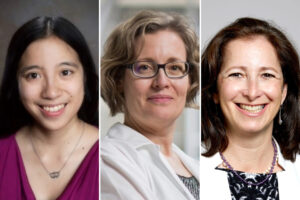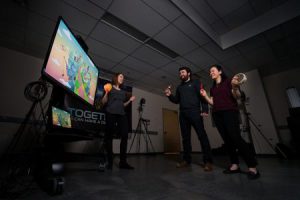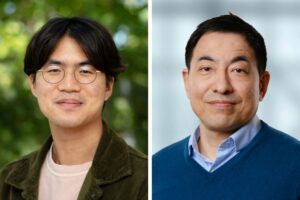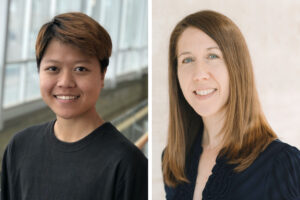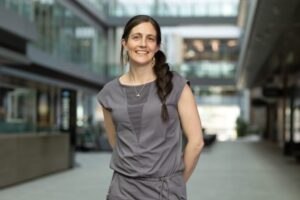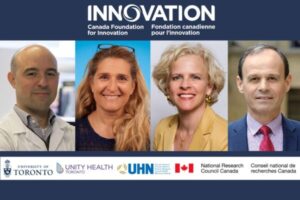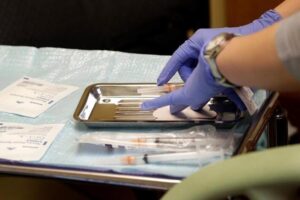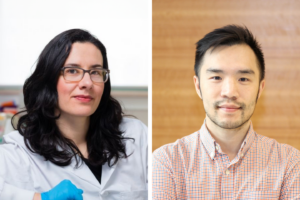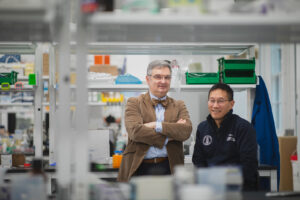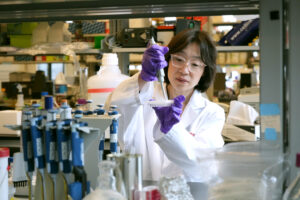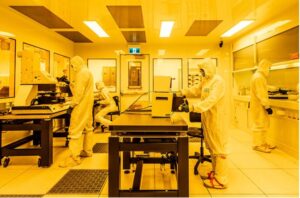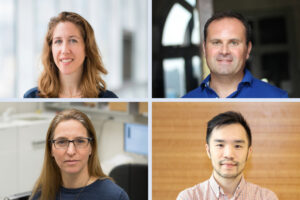Research News and Stories
Explore the latest news, stories, and groundbreaking research happening at the Institute of Biomedical Engineering. Stay updated on innovative projects, impactful discoveries, and the achievements of our talented students, faculty, and alumni shaping the future of biomedical science and engineering.
Quick Navigation
New imaging technique to improve the study of heart valve disease in mice
Researchers from the Institute of Biomedical Engineering (BME) at the University of Toronto and the Translational Biology and Engineering Program in the Ted Rogers Centre for Heart Research have developed an ultrasound imaging protocol that promises to transform how congenital heart valve diseases are studied in mice. This new technique allows scientists to identify structural abnormalities in the aortic valve of juvenile mice as young as four weeks old, paving the way for more efficient, cost-effective, and humane research practices.
Seven BME members receive Joint Seed Program funding for interdivisional research
Initiated in 2015, the Joint Seed Program is an interdivisional research funding program designed to promote multi-disciplinary research and catalyze new innovative partnerships between researchers from the Faculty of Applied Science and Engineering and those from outside of Engineering. The recipients for this year will undertake unique and innovative research initiatives ranging from developing bioinoculant strategies to equitable healthcare and advanced imaging techniques.
CIHR awards grant to training program integrating sex, gender, and intersectionality in health research
A team of researchers has been awarded an operating grant from the Canadian Institutes of Health Research (CIHR). The team, led by Dr. Tatyana Mollayeva, Dr. Milos Popovic, and Dr. France Légaré, is set to improve the landscape of health research by integrating sex, gender, and intersectionality into scientific inquiry.
Enhancing Neurostimulation
Researchers at UHN’s KITE Research Institute have recently leveraged the power of deep learning to improve nerve signalling interpretation, paving the way for more effective neuroprosthetic devices and offering new hope for those with impaired motor function.
New Models for Eye Disease
A research team at UHN’s Donald K. Johnson Eye Institute in collaboration with the Institute of Biomedical Engineering at the University of Toronto (U of T) has discovered that transplanted retinal cells can share essential materials with host cells in the lab, offering a promising avenue for delivering therapies directly to damaged areas of the eye.
Canadian Hub for Health Intelligence and Innovation in Infectious Diseases awarded $72 million to strengthen talent development and health intelligence
One of the CBRF-funded programs is the Biomanufacturing Hub Network, an immersive talent development program based at the University of Toronto led by U of T University Professor Molly Shoichet (ChemE, BME) along with Darius Rackus, an assistant professor of chemistry and biology at Toronto Metropolitan University, and Gilbert Walker, a professor of chemistry at U of T.
Computational model unveils dynamics of Deep Brain Stimulation
Deep Brain Stimulation (DBS) has been a longstanding adjunctive therapy for movement disorders like Parkinson’s disease, yet its precise mechanisms of action have remained elusive. In a recent study published in the journal Neuromodulation, Dr. Milad Lankarany and his team have introduced a computational model that accurately predicts the dynamics of neuronal activity during DBS across various frequencies.
New research aimed to improve early childhood music education
Researchers from the University of Toronto have unveiled a new technological breakthrough that promises to transform early childhood music education. The study addresses a critical gap in musical instrument classification, particularly concerning non-pitched percussion instruments. The findings are published in a recent issue of PLOS one.
Accelerate Seed Grant recipient aims to improve delivery of drugs that treat brain diseases using self-driving lab technology
Professor Leo Chou have received Acceleration Consortium Seed Grant funding for his research on building DNA origami as a delivery vehicle for therapeutic agents
Dr. Omar F. Khan honoured with the McCharles Prize for early career research distinction
Professor Omar F. Khan has been awarded the prestigious McCharles Prize for Early Career Research Distinction for his contributions to the fields of biomedical and immune engineering.
Enhancing Balance Rehabilitation
Researchers from UHN’s KITE Research Institute have investigated a new affordable and clinically accessible training system for improving the standing balance of spinal cord injury patients. The team led by Dr. Kei Masani, KITE Senior Scientist and senior author of the study, investigated the integration of low-cost and portable sensors like a depth camera and pressure mat, which use motion tracking and distribution of pressure, respectively, to analyze movement.
New study reveals insights into extracellular matrix’s influence on regeneration
A study published in the Journal of Cell Science, led by Professor Penney Gilbert (BME) and Jo Nguyen at the University of Toronto, shed light on the impact of culture substrate stiffness and extracellular matrix (ECM) ligands on the contractility, proliferation, and various cellular processes of human myoblasts. The study aims to understand how these factors influence the regenerative activities of muscle stem cells and their progeny, with implications for aging and disease.
Research utilizes machine learning to improve gait analysis in rehabilitation
The latest research led by Prof. Jan Andrysek published in a peer-reviewed article showcases a pioneering approach to gait analysis, a crucial aspect of rehabilitation and clinical diagnosis. Clinicians have long relied on gait indicators like step length, stride velocity, and joint angles to assess and treat gait issues. However, traditional statistical methods have limitations in analyzing the vast sets of data generated by instrumented gait analysis techniques.
BME Professor secures CIHR funding to improve autism medication selection
Dr. Azadeh Kushki (BME) has been awarded funding from the Canadian Institutes of Health Research (CIHR) for her work in improving medication selection for autistic children. Along with Dr. Danielle Baribeau, Dr. Melanie Penner, and Marlee Vandewouw at the Holland Bloorview Kids Rehabilitation Hospital, this funding provides operational support to perform research.
Heart-on-a-chip model created by U of T researchers uncovers insights into heart problems caused by COVID-19
University of Toronto researchers have created a unique heart-on-a-chip model that is helping untangle the causes of COVID-19-induced heart inflammation and uncover strategies to reduce its impact.
New Canada Research Chairs advance research in regenerative medicine, sustainable housing and more
New ways of growing human tissues outside the body, developed by Professor Alison McGuigan and her team, will help expand the ability of researchers to understand and control cell behaviour.
CRAFT-led team awarded $17.5M to create new generation of ‘distributed’ diagnostics
A team of researchers from the University of Toronto (U of T), Unity Health Toronto (Unity), University Health Network (UHN) and the National Research Council of Canada (NRC) have been awarded a $17.5M grant from the Canada Foundation for Innovation and partners to build the Diagnostic Horizons Lab (DHL) in Toronto.
Wellspring Data Limited and University of Toronto’s Institute of Biomedical Engineering Partner to Advance Cardiovascular Health Monitoring
Wellspring Data Limited announces a strategic partnership with BME. This collaboration aims to revolutionize cardiovascular health monitoring through cutting-edge research and innovative technology solutions.
Dr. Omar Khan comments on rising measles cases | CityNews
Dr. Omar F. Khan comments on the rising measles cases surge worldwide. Ensure your vaccinations are up to date, especially in BC where access to records varies.
Two BME faculty members were awarded the Accelerate Seed Grant and Accelerate Moonshot grant
Milica Radisic and Leo Chou are two BME faculty members who were awarded the Accelerate Seed Grant and Accelerate Moonshot grant, as a part of a $1.2 million total funding from the Acceleration Consortium
UHN and UofT Collaborate to Fast-track Tech Research into Applications
Groundbreaking collaboration between UHN and UofT aims to accelerate the transition of cutting-edge technology research into practical applications.
‘Images every second’: Researchers develop rapid MRI technique for better cancer detection and therapy
Professor Hai-Ling Cheng and her team have developed a rapid magnetic resonance imaging (MRI) technique to help doctors better detect and diagnose tumours. The 3D images generated from this new approach could provide physicians with guidance during surgery and other therapeutic interventions.
CRAFT 2.0: Academic hospital network joins centre for research on microfluidic devices for human health
The Centre for Research and Applications in Fluidic Technologies (CRAFT) has been extended to 2028 and has expanded to formally include Unity Health Toronto, an academic hospital network and leading Canadian health research institute.
Four Biomedical Engineering Faculty Members Secure CIHR Funding for Research Projects
Four esteemed faculty members from the Institute Biomedical Engineering (BME) at the University of Toronto have successfully secured funding from the Canadian Institutes of Health Research (CIHR) through the Project Grant Program’s fall 2023 funding cycle. The CIHR funding will support their cutting-edge research projects aimed at advancing health-related knowledge and outcomes.




